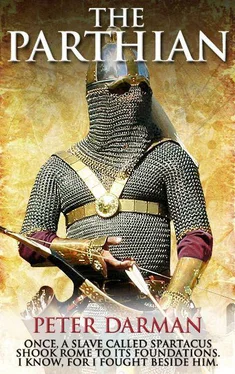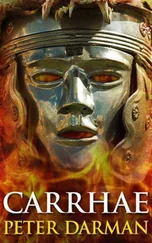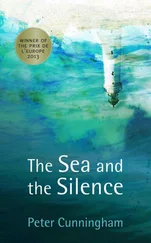Peter Darman - The Parthian
Здесь есть возможность читать онлайн «Peter Darman - The Parthian» весь текст электронной книги совершенно бесплатно (целиком полную версию без сокращений). В некоторых случаях можно слушать аудио, скачать через торрент в формате fb2 и присутствует краткое содержание. Год выпуска: 2011, Жанр: Исторические приключения, на английском языке. Описание произведения, (предисловие) а так же отзывы посетителей доступны на портале библиотеки ЛибКат.
- Название:The Parthian
- Автор:
- Жанр:
- Год:2011
- ISBN:нет данных
- Рейтинг книги:4 / 5. Голосов: 1
-
Избранное:Добавить в избранное
- Отзывы:
-
Ваша оценка:
- 80
- 1
- 2
- 3
- 4
- 5
The Parthian: краткое содержание, описание и аннотация
Предлагаем к чтению аннотацию, описание, краткое содержание или предисловие (зависит от того, что написал сам автор книги «The Parthian»). Если вы не нашли необходимую информацию о книге — напишите в комментариях, мы постараемся отыскать её.
The Parthian — читать онлайн бесплатно полную книгу (весь текст) целиком
Ниже представлен текст книги, разбитый по страницам. Система сохранения места последней прочитанной страницы, позволяет с удобством читать онлайн бесплатно книгу «The Parthian», без необходимости каждый раз заново искать на чём Вы остановились. Поставьте закладку, и сможете в любой момент перейти на страницу, на которой закончили чтение.
Интервал:
Закладка:
‘I wonder if they make it look like the insides of the buildings in Rome?’ said Vata.
Before I could answer a short man, about thirtyish and dressed in a simple beige linen tunic, approached us, his hair cropped short as was the Roman fashion.
‘Can I help you?’
‘We are just looking,’ I said.
‘At what?’ he snapped. ‘Are you businessmen?’
Our appearance — gold-edged white tunics and leggings, leather boots, ornate leather belts from which hung silver-decorated scabbards — suggested we weren’t. I saw no reason to hide our identities.
‘I am Prince Pacorus and this is my friend, Vata.’
The Roman looked directly at me. ‘So, you are the one who took the eagle.’
I detected a mocking tone in his voice.
‘It was easy enough,’ I replied, ‘I found it lying in the dirt.
He bristled at this. ‘Rome never forgets its enemies.’
‘Parthia always looks for new victories.’ I was enjoying our verbal duel.
He moved closer to me, our faces inches apart. His audacity, considering he was in my city, was astounding, but I was to become all too familiar with Roman arrogance. ‘We have many more legions, Parthian,’ he spat, his bad breath reeking in my nostrils.
I clutched the hilt of my sword with my right hand. ‘Then go and get them.’
‘Enough, Pacorus,’ said Vata, laying a hand on my arm. ‘Pick on someone your own size. It’s unfair to start a quarrel with the a dwarf.’
We both laughed, causing the Roman’s cheeks to turn red with rage, his fists clenched. We left the building and went back into the street.
‘Cocky little bastard, wasn’t he,’ remarked Vata.
‘I think we’ll be fighting Romans again very soon.’
‘How many legions do you think they have?’
‘No idea,’ I replied. ‘Who cares?’
Vata shrugged. ‘Still, at least they’re shorter than we are. It’s always easier to kill someone who’s smaller. I wouldn’t like to fight a race of giants.’
My father and I left for Ctesiphon three days later. Vistaspa came with us, of course, along with a hundred of my father’s bodyguard, a hundred horse archers and our tents, food and spare weapons loaded onto forty camels. Ctesiphon was two hundred miles from Hatra, a journey that we made at a leisurely pace.
The journey through the kingdom allowed my father to inspect part of his domain. He always told me that it was important for the people to see their rulers, which also offered an opportunity for them to speak to him. Many kings viewed their subjects with distaste and suspicion, believing themselves to be appointed by gods to rule on earth.
‘That is a very dangerous way of thinking, to my mind,’ he said as we rode past a group of workers repairing an irrigation ditch in a field. ‘Some of them, and I have met them, believe that they are semi-divine themselves. That’s all very well until some common soldier in an opponent’s army shoots them with an arrow or runs them through with a sword. They don’t look so god-like when their guts are spewing all over the place.
‘It is true, for example, that you were born into a royal household and thus were a prince from birth, but the kingdom you will eventually inherit will grow rich only if you ensure the welfare of your subjects.’
‘All of them?’ I asked.
‘We can do nothing about plagues and famine. These things are sent by Shamash. But we can ensure that the kingdom is safe. And a safe kingdom is a prosperous kingdom. If this land,’ he waved his hand to indicate all around, ‘was infested with bandits there would be no trade passing through, no well-tended fields to harvest and no functioning irrigation ditches to water the fields. The people would flee and we would live as paupers. Our swords and lances keep the peace and allow the people to prosper. Always remember that, for when you forget it the kingdom is doomed.’
‘Yes, father.’
And he was right. The land, our land, was rich and prosperous. The distance between the Euphrates and Tigris is two hundred miles at its widest point, and in the area along their banks extending inland grains, vegetables and dates were cultivated, a complex system of irrigation dykes and ditches draining water from the rivers and keeping the land fertile. Oxen were used to pull ploughs, and cows, sheep and goats provided dairy products and meat. There was also a thriving textile industry producing wool for cloth and flax for linen.
The land itself was owned by nobles but worked by farmers, each of whom paid rent to their vassal lord. The aristocrats who lived in Hatra owned vast estates, but those who lived in their villas in the countryside owned much smaller tracts of land. It was the duty of each farmer to own a horse and a bow and practice his horsemanship and archery skills on a regular basis. In this way Hatra had a ready reserve of soldiers that could be called on. Inevitably there were some who neglected their military duties for farm work, but in general the system worked well enough. And when a general muster was issued, the lords were the first to ride to war. Parthian kings and nobles always led from the front.
The heat of the summer was receding now and the days were sunny but not stifling. The harvests were being gathered, which meant every road was filled with carts pulled by donkeys. When our column neared them, the carts and any human traffic on the road would move aside to let us pass. They bowed to my father and then carried on with their tasks.
‘You see, Pacorus,’ remarked my father, ‘they do not feel threatened by the appearance of soldiers.’
‘That’s because they are lazy and stupid,’ remarked Vistaspa, who had drawn level with us after leading a scouting party.
‘That’s because they feel safe,’ said my father.
‘They’ve become too accustomed to peace,’ growled Vistaspa.
‘But our army is the finest in the Parthian Empire, is it not?’ I added.
‘The army is, yes,’ said Vistaspa, ‘but if we have to issue a general call-up we’ll be in trouble.’
‘Not every man can be a warrior,’ remarked my father.
‘More’s the pity,’ said his bodyguard’s commander. Vistaspa then muttered something under his breath and rode towards the rear of the column, no doubt to take out whatever was irritating him on some poor trooper.
My father smiled. ‘He’s a good man, Vistaspa,’ I remained silent, ‘but he is too intolerant, I fear. But there is no man I would rather have beside me in battle.’
Ctesiphon was something of a disappointment. It was undoubtedly large and sprawling, but its squat brick buildings were dirty and its walls were also brick and coloured a dark yellow. It was also poor, or at least its inhabitants were. The people eked out an existent from agriculture, but the Silk Road did not pass through Ctesiphon, and therefore it could not tap its wealth. But it did not have to, for all kingdoms in the empire paid tribute to the King of Kings, thus there was a constant flow of money to the capital, though it obviously was not spent on its defences.
We were met outside the city by a detachment of cavalry led by the son of Sinatruces, Phraates. They carried the eagle standard of the King of Kings and were well appointed, with bright steel helmets, whetted lances and burnished shields. They wore mail vests and red cloaks on their backs. Phraates himself, bare headed, rode at the head of the column and greeted my father as an equal, as he was a king in his own right.
‘Greetings, King Varaz,’ he bowed his head. My father reciprocated. Phraates then looked at me. ‘And this must be your son, Prince Pacorus, whom we have heard so much of.’
I bowed my head. ‘Highness.’
Phraates was a studious-looking individual, his hair cropped just above his shoulders with a neatly trimmed, short beard flecked with grey. He had a broad face and a rather bulbous nose. I guessed he was nearing sixty years of age.
Читать дальшеИнтервал:
Закладка:
Похожие книги на «The Parthian»
Представляем Вашему вниманию похожие книги на «The Parthian» списком для выбора. Мы отобрали схожую по названию и смыслу литературу в надежде предоставить читателям больше вариантов отыскать новые, интересные, ещё непрочитанные произведения.
Обсуждение, отзывы о книге «The Parthian» и просто собственные мнения читателей. Оставьте ваши комментарии, напишите, что Вы думаете о произведении, его смысле или главных героях. Укажите что конкретно понравилось, а что нет, и почему Вы так считаете.












